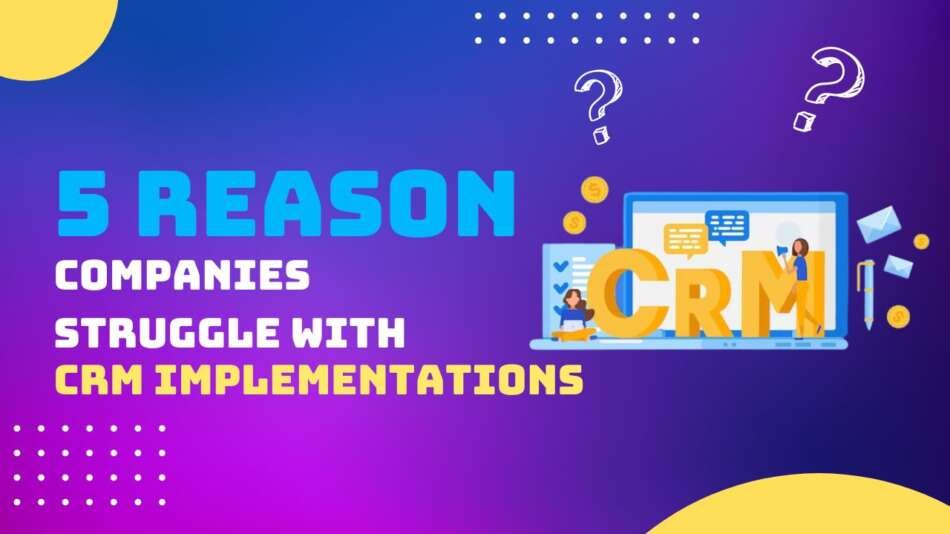Customer Relationship Management (CRM) systems have become integral tools for businesses aiming to enhance customer interactions, streamline operations, and drive growth. However, despite their potential benefits, many companies face challenges during CRM implementation.
Let’s delve into the five key reasons why companies often struggle with CRM implementations and how they can overcome these hurdles.
1. Lack of Clear Strategy and Goals
One of the primary reasons companies struggle with CRM implementations is the absence of a clear strategy and well-defined goals. Without a roadmap, businesses often dive into CRM adoption without fully understanding how it aligns with their objectives. This lack of direction leads to confusion, misalignment, and an inability to measure the success of the implementation.
To overcome this challenge, companies must begin with a comprehensive assessment of their needs and pain points. Define specific goals for the CRM implementation, such as improving customer engagement, increasing sales conversion rates, or streamlining communication. With a clear vision in mind, create a detailed strategy that outlines the steps to achieve these goals.
Involve key stakeholders from different departments in the planning process to ensure that the CRM meets various business needs. Regularly communicate the strategy and progress to all employees, fostering a sense of ownership and alignment. With a well-defined strategy and measurable goals, companies can navigate the CRM implementation journey with confidence.
2. Insufficient User Training
Even the most advanced CRM system can fail to deliver value if users are unfamiliar with its functionalities. Insufficient user training is a common hurdle that hinders successful CRM implementation. When employees are unsure about how to use the CRM effectively, they may resort to old workflows, rendering the CRM redundant.
To address this challenge, invest in thorough and ongoing user training. Develop training programs that cater to different user roles and skill levels. Cover essential features, data entry protocols, and reporting capabilities. Conduct hands-on workshops and provide access to training materials and resources.
Empower employees to explore the CRM’s functionalities through guided simulations and interactive modules. Offer refresher courses as the CRM evolves or when new features are introduced. Additionally, create a support system where users can seek assistance and resolve queries promptly. By prioritizing user training, companies ensure that employees are equipped to leverage the CRM’s capabilities to the fullest.
3. Data Quality Issues
Data integrity is the cornerstone of a successful CRM implementation. Companies often struggle when they disregard data quality during the setup phase. Poor data quality can lead to incorrect insights, compromised decision-making, and hindered customer experiences. Before implementing a CRM system, it’s imperative to conduct a thorough data audit and cleansing process.
To overcome this challenge, Identify and rectify data duplicates, inaccuracies, and incomplete records. Utilize data validation rules to prevent faulty information from entering the CRM database. Regularly monitor and maintain data hygiene to ensure that the CRM remains a trusted source of information over time.
Also Read: Benefits Of Implementing A CRM System For Small Businesses
4. Resistance to Change
Embracing new technologies and processes can be met with resistance from employees, regardless of their potential benefits. The fear of change, disruption of routines, and uncertainties surrounding the CRM’s adoption often lead to pushback. To mitigate this challenge, it’s essential to implement a comprehensive change management strategy.
Engage employees from the outset of the CRM implementation journey. Communicate the rationale behind adopting the CRM, emphasizing how it aligns with the company’s goals. Address concerns openly and provide ample opportunities for employees to voice their opinions. Offer training sessions and workshops to familiarize employees with the CRM’s functionalities and showcase how it simplifies their tasks.
5. Inadequate Customization and Integration
CRM systems aren’t one-size-fits-all solutions. The struggle arises when companies fail to customize the CRM to meet their unique requirements or integrate it seamlessly with existing tools. A lack of customization leads to inefficiencies, as employees are forced to adapt their processes to the CRM’s limitations. Additionally, isolated systems hinder a cohesive workflow.
To overcome this hurdle, collaborate with CRM development services that specialize in tailoring solutions to your business needs. Customize the CRM to align with your workflows, data structures, and reporting requirements. Moreover, prioritize integration with other essential tools like marketing automation platforms, customer support systems, and sales analytics software. This integration ensures a unified ecosystem, enhancing data flow and providing a holistic view of customer interactions.
By addressing these challenges and taking proactive steps, companies can maximize the potential of their CRM systems and achieve their business objectives effectively.
Conclusion
In the ever-evolving business landscape, CRM implementations play a pivotal role in driving customer engagement and operational efficiency. However, companies must navigate various challenges to realize the full potential of their CRM investments. By addressing these five key hurdles – defining clear goals, providing robust user training, ensuring data quality, managing resistance to change, and prioritizing customization and integration – companies can successfully implement CRM systems that empower growth and success.
Incorporating a CRM is more than a technological upgrade; it’s a strategic decision to enhance customer relationships and streamline business operations. With a well-defined plan, continuous support, and a commitment to addressing challenges, companies can overcome obstacles and leverage CRM implementations as catalysts for their future success.


